Help us protect the commons. Make a tax deductible gift to fund our work. Donate today!
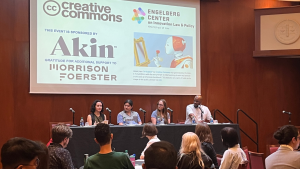
“Generative AI & the Creative Cycle Panel” by Jennryn Wetzler for Creative Commons is licensed via CC BY 4.0.
This week, Creative Commons (CC) convened 100+ participants during two events in New York City to discuss the important issues surrounding generative artificial intelligence (AI), copyright, and creativity.
For many years, we at CC have been examining the interplay between copyright and generative AI, exploring ways in which this technology can foster creativity and better sharing, i.e. sharing that is inclusive, equitable, reciprocal, and sustainable — and it is through this lens that we strive to tackle some of the most critical questions regarding the potential of generative AI tools for creators, cultural heritage institutions, and the general public.
In search of answers we have been holding community consultations over the past months to consider how best to maximize the public benefits of AI, to address concerns with how AI systems are trained and used, and to probe how AI will affect the commons. These two NYC events come within the scope of these wider consultations aimed at assisting us in taking action with informed intention.
On 12 September, we ran a workshop at the offices of Morrison Foerster to unpack the multiple issues that arise once generative AI enters the creativity cycle. If all creativity remixes the past — which needs to be responsibly preserved and cared for — is generative AI a game changer? This was the question an interdisciplinary mix of participants approached with insight and empathy throughout the afternoon’s dynamic sessions. History teems with examples of how humans dealt with technological disruptions in the past (from the printing press and oil painting to photography), yet many participants pointed to the need to think differently and imagine new structures for AI to deliver on its promise to enhance the commons. Issues around attribution, bias, transparency, agency, artistic identity and intent, democratization of AI, and many others, peppered the discussions in small and large groups. While no definite pathways emerged, participants embraced the uncertainty and relished the prospect of generative AI being used for the common good.
The conversations flowed through the following day’s symposium, Generative AI and the Creativity Cycle, at the Engelberg Center at New York University. 100 participants attended the event, which brought together experts from various fields — including law, the arts, cultural heritage, and AI technology — speaking on seven panels covering a wide range of issues at the nexus of creativity, copyright, and generative AI.
Running like red threads across the panels, here are some of the key themes that surfaced throughout the day’s lively conversations:
- Transparency: This requirement was often cited as a precondition for society to build trust in generative AI. Transparency was deemed essential in the datasets, algorithms and models themselves, as well as in AI systems in general. Similarly, a focus on the ways users of AI content could be transparent about their processes was also needed. This tied closely to notions of attribution and recognizing machine input into creative processes.
- Attribution (or similar notions of recognition, credit, or acknowledgement): This feature reflects CC’s emphasis on better sharing: nurturing a fair and equitable sharing ecosystem that celebrates and connects creators.
- Bias: The problem of bias in AI models as well as the inequalities they perpetuate and compound came up in most if not all sessions. The imperative to address bias was raised alongside calls for greater diversity and inclusion, as is already undertaken in data decolonization efforts.
- Economic fairness: Several discussions pointed to a need for fair remuneration, distributive justice, and a universal basic income, as well as employment protection for creators.
- Copyright issues (both on the input/training and output levels): While some speakers suggested a sense of loss of control due to a lack of copyright-based permission or consent, others reiterated the fundamental right for anyone to read and absorb knowledge including through machine-automated means.
- A multi-pronged approach: Given the multifaceted nature of the challenges raised by generative AI, many speakers highlighted the need to engage on multiple levels to ensure responsible developments in AI. This tied in with the need for adequate incentives and support for open sharing, a sustainable open infrastructure, culture as a public good, sharing in the public interest, all in order to prevent further enclosures of the commons.
- Collaboration: Collaborative creation with machines as well as with other humans could give rise to a “remix culture 2.0,” where generative AI as a tool could assist in the emergence of new forms of creativity through “amalgamated imagination.”
Although the above summary does not do justice to the depth and thoughtfulness of the event’s discussions, it does give a flavor of the topics at stake and should help inform those thinking about AI development, regulation, and its role in supporting better sharing of knowledge and culture in our shared global commons.
A special thank you to our workshop participants and symposium speakers and moderators. We are grateful to have had the opportunity to connect with many of you and share diverse perspectives on this complex topic. We are grateful to Morrison Foerster for supporting the workshop, donating space and resources. We’d also like to thank our lead symposium sponsor Akin Gump as well as the Engelberg Center on Innovation Law & Policy for publicly hosting these important conversations.
View symposium video recordings
Subscribe to CC’s email newsletter to stay informed about all our work with AI, culture and creativity, and more.
Continue the discussion on AI and the commons at the CC Global Summit during 3–6 Oct 2023 in Mexico City >
Check out these images from different panels during the symposium!
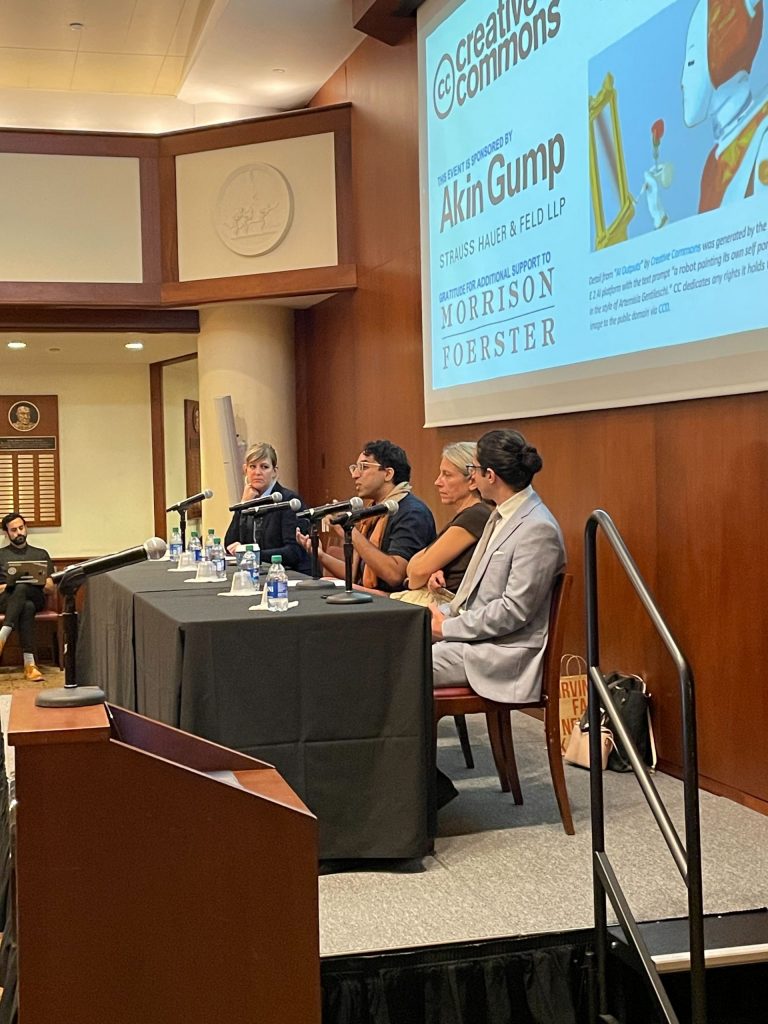
“Generative AI & the Creative Cycle Panel A” by Anna Tumadóttir for Creative Commons is licensed via CC BY 4.0.
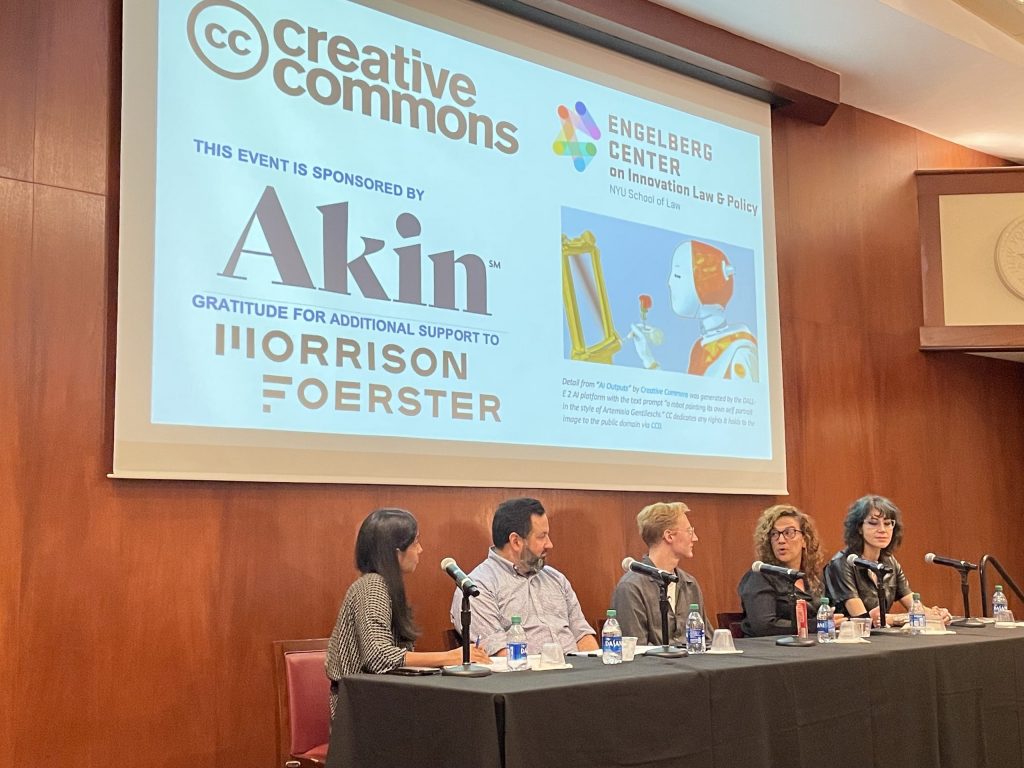
“Generative AI & the Creative Cycle Panel B” by Brigitte Vézina for Creative Commons is licensed via CC BY 4.0.
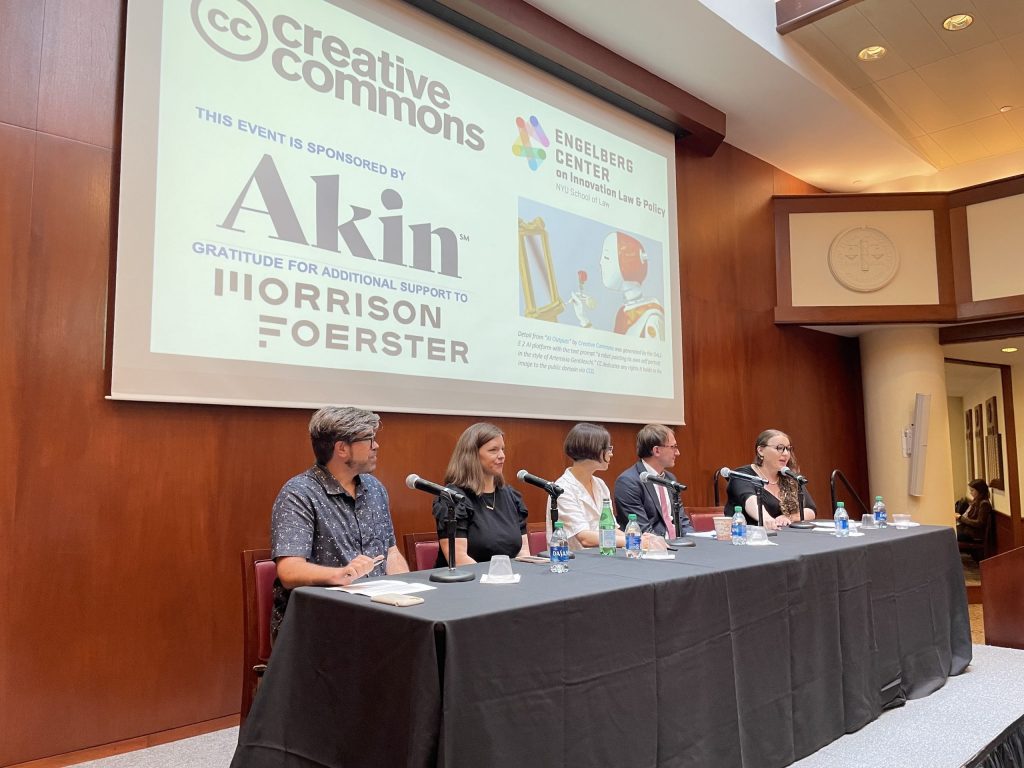
“Generative AI & the Creative Cycle Panel C” by Brigitte Vézina for Creative Commons is licensed via CC BY 4.0.
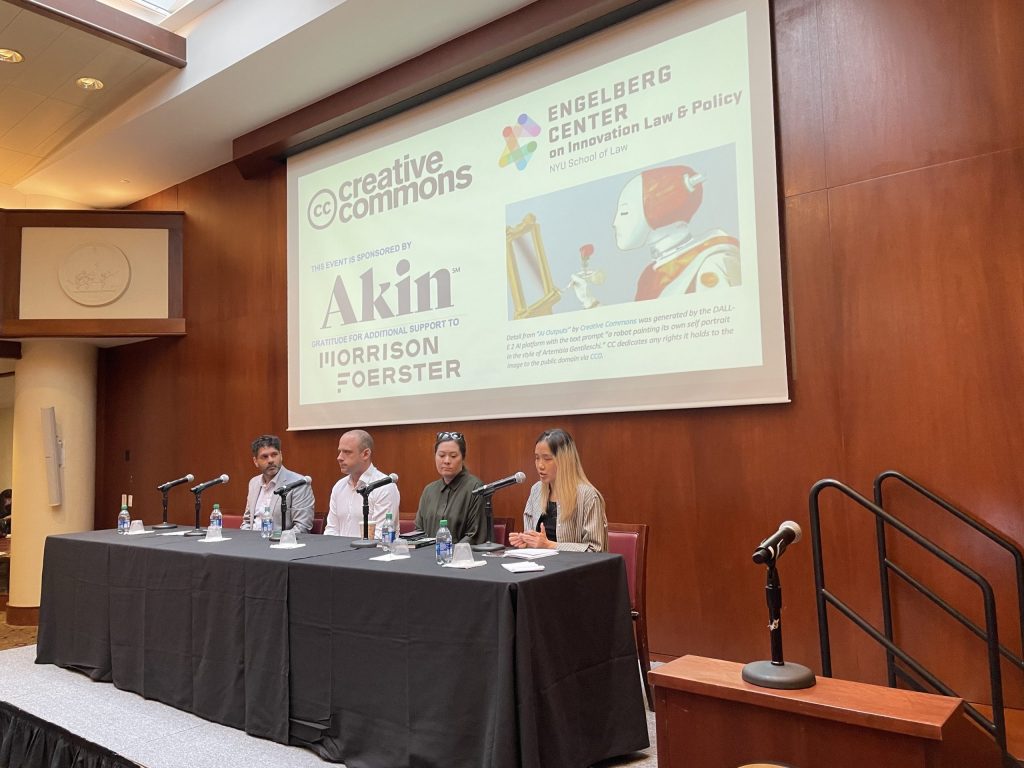
“Generative AI & the Creative Cycle Panel D” by Brigitte Vézina for Creative Commons is licensed via CC BY 4.0.
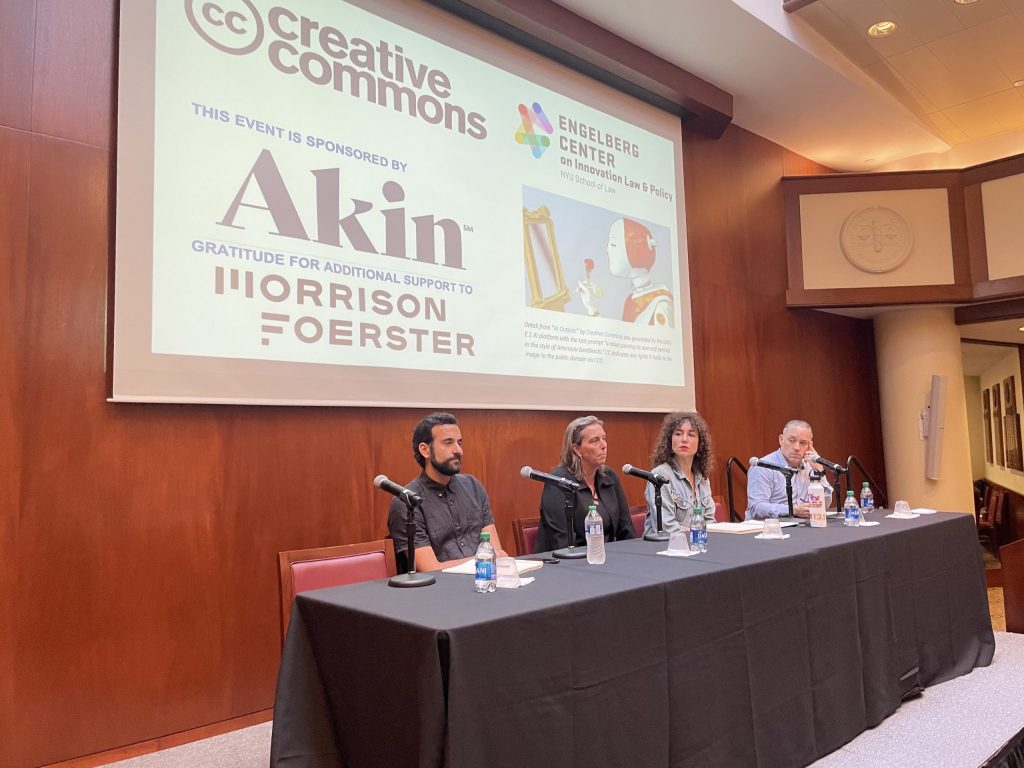
“Generative AI & the Creative Cycle Panel E” by Brigitte Vézina for Creative Commons is licensed via CC BY 4.0.
Like the rest of the world, CC has been watching generative AI and trying to understand the many complex issues raised by these amazing new tools. We are especially focused on the intersection of copyright law and generative AI. How can CC’s strategy for better sharing support the development of this technology while also respecting the work of human creators? How can we ensure AI operates in a better internet for everyone? We are exploring these issues in a series of blog posts by the CC team and invited guests that look at concerns related to AI inputs (training data), AI outputs (works created by AI tools), and the ways that people use AI. Read our overview on generative AI or see all our posts on AI.
Note: We use “artificial intelligence” and “AI” as shorthand terms for what we know is a complex field of technologies and practices, currently involving machine learning and large language models (LLMs). Using the abbreviation “AI” is handy, but not ideal, because we recognize that AI is not really “artificial” (in that AI is created and used by humans), nor “intelligent” (at least in the way we think of human intelligence).